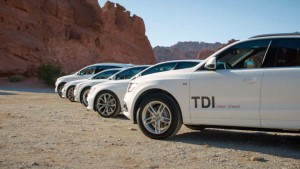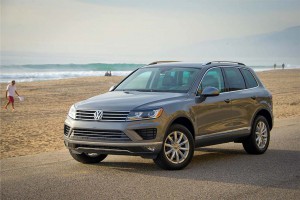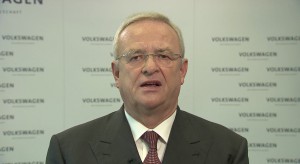
A line-up of Audi TDI models. The automaker may have to boost its reserve to cover the diesel scandal.
The settlement covering a rigged, 3.0-liter turbodiesel could cost Volkswagen as much as $4 billion if it cannot come up with the necessary fix for nearly 60,000 vehicles whose engines were rigged to illegally pass U.S. emissions tests – at least three times more than the initial settlement calls for.
The impact of the scandal – which previously saw VW agree to pay out $14.7 billion to cover nearly 500,000 vehicles using a smaller diesel engine – continues to grow, and to spread. German mega-supplier Robert Bosch GmbH now has negotiated its own settlement, which will require it to pay $327.5 million to American owners of VW diesels.
Meanwhile, VW’s Audi division is now examining whether it has set aside enough money to cover its share of the burden. It has already set the figure at 980 million euros, or $1.06 billion at the current exchange rate. Audi sold a number of different models in the U.S. using both the 2.0- and 3.0-liter turbodiesels.
(Toyota cedes global sales crown for 2016 to VW. Click Here for the story.)
Finalizing the 3.0-liter settlement in a U.S. federal court marks one of the last hurdles for VW to move beyond the diesel scandal that erupted in September 2015 when the U.S. Environmental Protection Agency charged it with using a “defeat device” to illegally pass emissions rules. The system was able to detect when a vehicle was being tested and sharply reduce pollution levels. The EPA subsequently said the bigger engine had also been rigged, VW acknowledging the subterfuge soon afterwards.
The maker agreed to a $14.7 billion plan in July that will force it to buy back most of the vehicles equipped with the 2.0-liter diesel. But the latest deal is based on expectations that it will only have to repurchase about a quarter of the cars using the larger engine. Those were produced during the 2009 to 2012 model-years, the maker confirmed today, acknowledging no readily available fix would bring it into compliance with emissions mandates.
But it expects to be able to deliver a fix acceptable to regulators for the remaining 58,000 vehicles sold from 2013 through the 2016 model-years, according to Hinrich Woebcken. The CEO of Volkswagen Group of American said owners “will have a resolution available to them. We will continue to work to earn back the trust of all our stakeholders.”
According to a statement issued Wednesday by the carmaker, “Volkswagen will begin the 3.0L TDI settlement program as soon as the Court grants final approval to the settlement agreements. At the earliest, approval will occur in May 2017.”
The potential wrinkle is that VW will have to buy back all those vehicles if it cannot come up with an acceptable repair, and that could boost the price tag to more than $4 billion.
Getting a fix in place would not only cut the cost of the latest settlement but also put VW in the position of being able to start selling diesel vehicles in the U.S. again. They have been off the market since the scandal broke.
The maker has actually indicated it won’t relaunch diesels under the VW brand, but Scott Keogh, the CEO of Audi of America, recently said the luxury brand may bring back the 3.0-liter diesel in one or two of its models.
While VW’s image has been badly damaged by the diesel scandal, it has begun to see a turnaround, U.S. sales rising 17% last year over January 2016. Audi has largely escaped the image hit and announced record volume last month.
(For more on January car sales, Click Here.)
But the luxury brand, which operates as a semi-autonomous subsidiary, has taken a financial hit. And that could grow.
“We are using the court documents to review what we still need to set aside for the annual accounts,” an Audi spokesman said in Germany.
Separately, Robert Bosch, a key supplier on the VW diesel program, was accused of participating in the scam. It now will pay $327.5 million to U.S. diesel owners, as well.
Along with the two major U.S. civil settlements, Volkswagen has agreed to pay $1 billion to its American dealers. And it last month agreed to a $4.3 billion criminal fine. Six of its managers also face criminal charges, though only one is currently in U.S. custody. Additional indictments could follow, said Loretta Lynch, the U.S. Attorney General who retired at the end of the Obama Administration.
Separately, German prosecutors last month said they were increasing scrutiny of senior VW executives, notably including former CEO Martin Winterkorn, who resigned shortly after the diesel emissions scandal broke in late 2015.
(For more on Winterkorn’s legal troubles, Click Here.)


